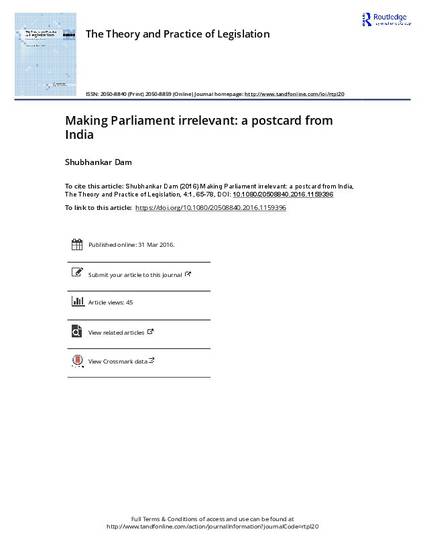
Article
Making Parliament Irrelevant: A Postcard from India
Theory and Practice of Legislation
(2016)
Abstract
Separation of powers is a common feature of modern constitutions. The three principal branches of government perform distinct functions. But they aren't exclusive; the functions often overlap. This article is about one such overlap: The power of the executive to make primary legislation. Ordinarily, Parliament makes laws in India. But the Indian executive also enjoys vast legislative powers. The Indian Constitution, in Article 123, authorises the executive to promulgate ordinances if certain conditions are satisfied. These ordinances are temporary; they lapse without parliamentary ratification in due course. What about reintroducing a lapsed ordinance? It is a byzantine workaround. Is it legal? This question takes centre-stage in this analysis. Clearly, much is at stake. The Constitution confers ordinances a limited life. Repromulgation prolongs it. Repeated repromulgation prolongs it indefinitely. With the power to repromulgate, the executive becomes something more - it becomes a legislature. What remains of separation of powers then? This article does two things. It lays out the data on repromulgation at the state and national level. Then it canvases an array of analytical arguments against this practice. It argues that repromulgation is unconstitutional - it is always so. There are no exceptions. The Supreme Court, the article argues, must, therefore, reconsider its analysis on this matter.
Keywords
- Article 123,
- ordinance,
- repromulgation,
- India,
- judicial review,
- DC Wadhwa v State of Bihar
Disciplines
Publication Date
Spring April, 2016
Citation Information
Shubhankar Dam. "Making Parliament Irrelevant: A Postcard from India" Theory and Practice of Legislation (2016) Available at: http://works.bepress.com/shubhankar_dam/48/
